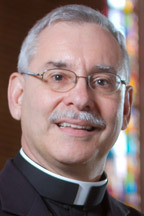
Bishop Anthony B. Taylor delivered this homily Oct. 13.
You and I have rights. Some of our rights are granted or regulated by the state of Arkansas for the common good, for instance: the right to a free public education, the obligation to pay taxes and the law that we wear seatbelts.
Our state has the authority to legislate these things. But there are other matters that lie beyond our state government’s area of competence. For instance: national defense. We can’t have all 50 states making their own defense policy — defense is a federal matter. So too is immigration and as many of you know, yesterday we had a rally at the State Capitol calling for comprehensive immigration reform, much like we do every January calling for an end to abortion.
We can’t have every state making its own immigration policy — immigration is a federal matter. But here too, the authority of our federal government is limited by the laws of a yet higher power: our God-given rights, which belong to everyone, regardless of their nationality. The Declaration of Independence calls these “unalienable” rights because no one has the right to deny us these rights — not the king of England, nor the government of the United States, because these rights come to all human beings directly from God. Our Declaration of Independence lists three unalienable rights: the right to life — hence the absolute inadmissibility of abortion — and the right to liberty and the pursuit of happiness.
Other rights flow from these, including the right to immigrate if circumstances so require because the right to life includes the right of access to those things necessary for life even if these are not available in one’s place of origin, a right that our own ancestors exercised in choosing to come to the United States.
With this also comes the right to participate fully in the life of the community in which we live. The government should pass laws to facilitate the orderly exercise of these rights for the common good, but contrary to what some think, the government does not have the authority to deny us these rights because they are inalienable. They come directly from God.
In today’s Gospel we have the story of Jesus healing 10 lepers. In those days, the God-given human rights of lepers were not respected. They were forced to live on the edge of society. They survived by living in groups for mutual support, like the 10 lepers in today’s Gospel, and they were paid poorly for doing the most unpleasant jobs no one else was willing to do, lonely, and forced by circumstances to live far from their families.
The point of the Gospel is that the only one who returned to thank God for his cure was a foreigner, a Samaritan. But notice what they had to be grateful for: Jesus didn’t only heal them, he also restored them to society, removed an obstacle to the full exercise of their human rights. They didn’t have to live as outcasts anymore; he restored to them the right to participate fully in the life of their community.
As I said, yesterday we had a rally at the State Capitol in support of immigration reform. This is a human rights issue. We too live in a society where people’s human rights are not respected: our society treats those without papers something like lepers were treated 2,000 years ago, on the edge of society, paid poorly for doing the most unpleasant jobs that no one else is willing to do, lonely, forced by circumstances to live far from their families.
And so we pray that through our efforts and the efforts of other people of good will, that Jesus will soon remove this obstacle to peoples’ full exercise of their human rights, admitting them to full participation in the life of our community.
Then we will all have one more reason to return giving thanks to God — just like that Samaritan, just like that foreigner in Jesus’ time, 2,000 years ago.
Please read our Comments Policy before posting.
Article comments powered by Disqus Winning directory photo honors Our Lady of Guadalupe
Winning directory photo honors Our Lady of Guadalupe
 St. Paul says: How does the Bible define love?
St. Paul says: How does the Bible define love?
 6 steps to getting married in Diocese of Little Rock
6 steps to getting married in Diocese of Little Rock
 Most frequently asked questions on Catholic marriage
Most frequently asked questions on Catholic marriage
 St. Joseph a model of solidarity with immigrants
St. Joseph a model of solidarity with immigrants
 Two gifts after Jesus’ death: Virgin Mary and Eucharist
Two gifts after Jesus’ death: Virgin Mary and Eucharist
 Why we have an altar, and not just a communion table
Why we have an altar, and not just a communion table
 Pope: Wars should be resolved through nonviolence
Pope: Wars should be resolved through nonviolence
 Living relationship with Jesus Christ in the Eucharist
Living relationship with Jesus Christ in the Eucharist